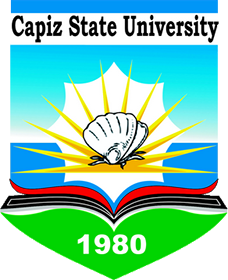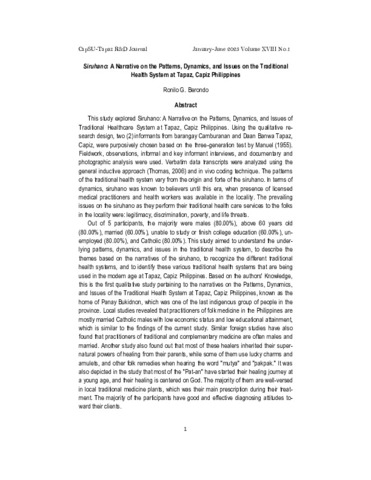Teachers’ research engagement and challenges|: bases for mentoring program
| dc.contributor.author | Berondo, Ronilo | |
| dc.contributor.author | Onapan, Ma. Socorro Irmina | |
| dc.coverage.spatial | Tapaz, Capiz, Philippines | en |
| dc.date.accessioned | 2024-03-14T06:09:17Z | |
| dc.date.available | 2024-03-14T06:09:17Z | |
| dc.date.issued | 2023-01 | |
| dc.identifier.citation | Berondo, R.G. and Onapan, M.S.I. (2023). Teachers’ research engagement and challenges|: bases for mentoring program. CapSU Tapaz R & D Journal, XVIII (1), 13-18. | en |
| dc.identifier.issn | 2012-3507 | |
| dc.identifier.uri | https://repository.capsu.edu.ph/handle/123456789/188 | |
| dc.description.abstract | This study investigated the following questions: a. what is the demographic profile of teachers in terms of sex, age, length of service, and educational attainment? b. What is the level of teachers' research engagement in the areas of qualitative and quantitative research? c. What are the challenges of teachers in research in the areas of qualitative and quantitative research? d. What mentoring program will be formulated? This study is descriptive in nature. Data were collected from the 200 teachers from the Tapaz East and Tapaz West District, Division of Capiz, and were analyzed qualitatively. Results of the study revealed that 145, or 72.5 percent were young while 55 or 25.5 percent, were old. In terms of sex, 153 or 78 percent were female while 44 or 22 percent were male. In terms of length of service, 89, or 44.5 percent, were new, while 111, or 55.5 percent, were old. In terms of educational attainment, 125 or 62.5 percent were bachelor's degree holders, 55 or 27.5 percent were master's degrees, and 20 or 10 percent were Doctorate degree holders. In terms of the level of teachers' research engagement in the areas of qualitative research and quantitative research, 108 or 54 percent of the teachers were highly engaged; 67 or 33.5 percent of them were engaged; 20 or 10 percent were less engaged, and 5 or 2.5 percent were not engaged. The majority of the teacher respondents agreed that the challenges encountered according to rank: additional workload and burden on the part of the teacher (42%), lack of time (16.5%), writing anxiety (14.5%), lack of support from the school (9.5%), lack of sufficient reference materials (9%), and inadequate knowledge regarding the conduct of research (8.5%). Most of the respondents encountered challenges in conducting research, like the lack of time, had anxieties in writing and conducting the study, and perceived research as an additional burden on their part. Additionally, analyzing the quantitative and qualitative data in identifying the issues to be investigated has been a tough challenge for them as well. And so, the researcher of this study has made a mentoring program to resolve the challenges and difficulties experienced by the teachers who conducted the research and will be used by future teacher-researchers. | en |
| dc.language.iso | en | en |
| dc.publisher | Tapaz Satellite College, Capis State University | en |
| dc.subject | descriptive research | en |
| dc.subject | engagement and challenges | en |
| dc.subject.lcsh | research-challenges | en |
| dc.subject.lcsh | research - engagement | en |
| dc.subject.lcsh | teachers - researchers | en |
| dc.title | Teachers’ research engagement and challenges|: bases for mentoring program | en |
| dc.type | Article | en |
| dc.citation.journaltitle | CapSU Tapaz R & D Journal | en |
| dc.citation.volume | Vol. 18 | en |
| dc.citation.issue | No.1 | en |
| dc.citation.firstpage | 13 | en |
| dc.citation.lastpage | 18 | en |

